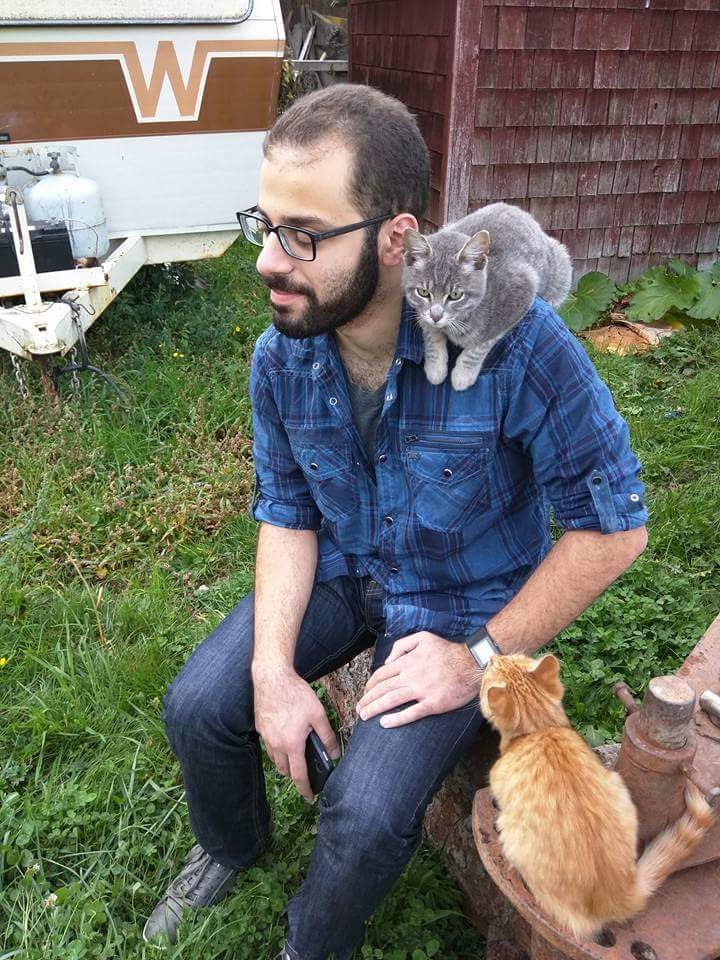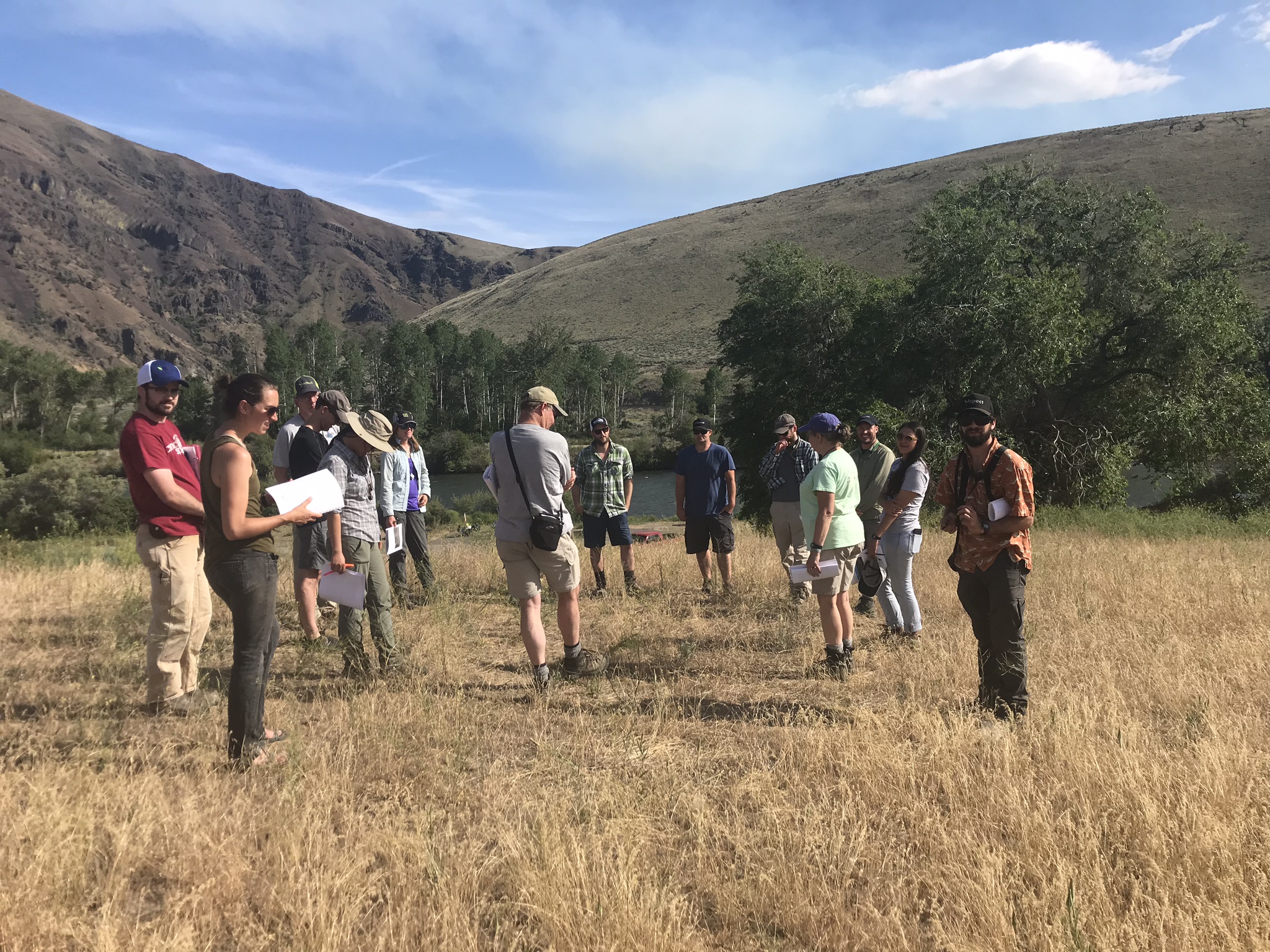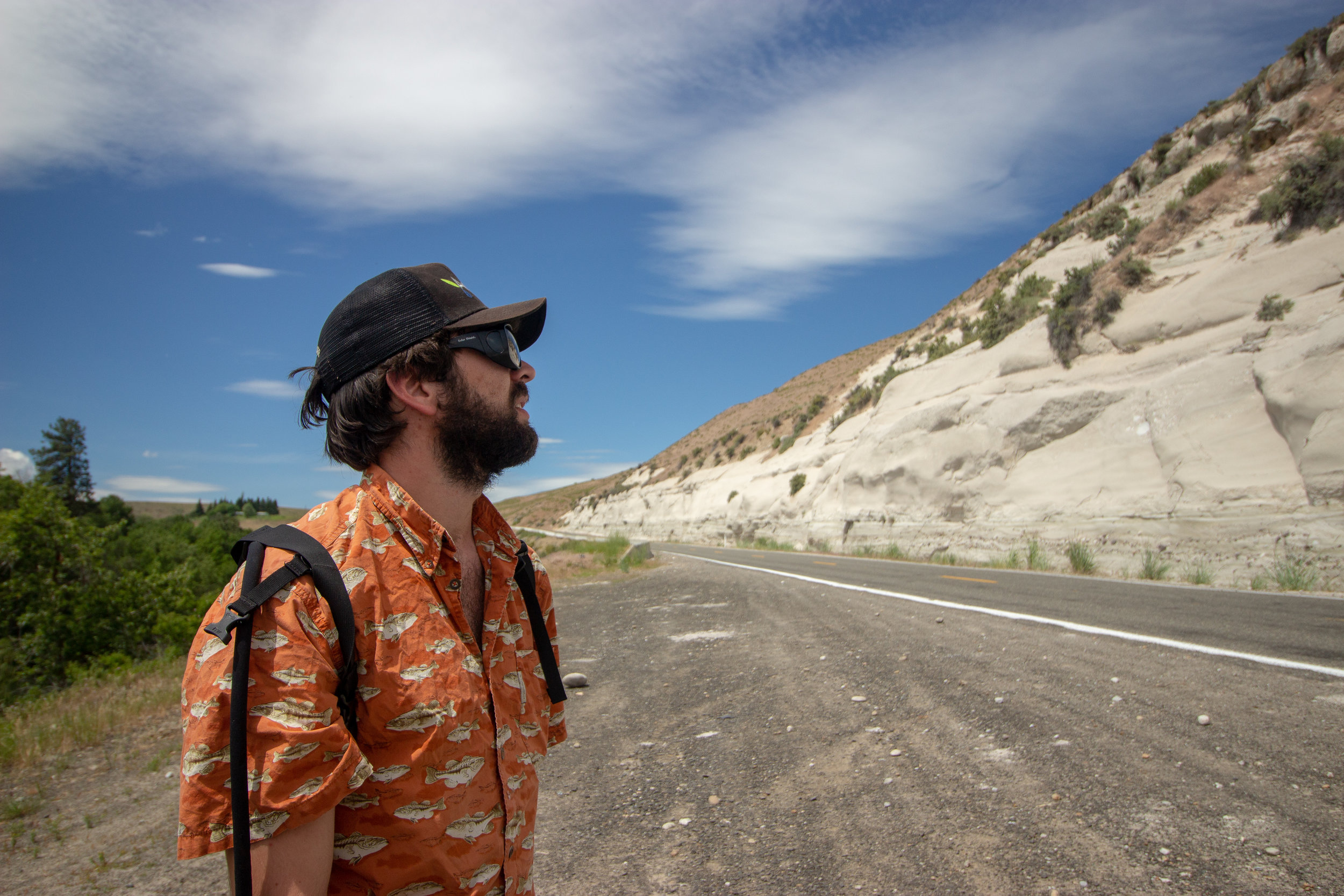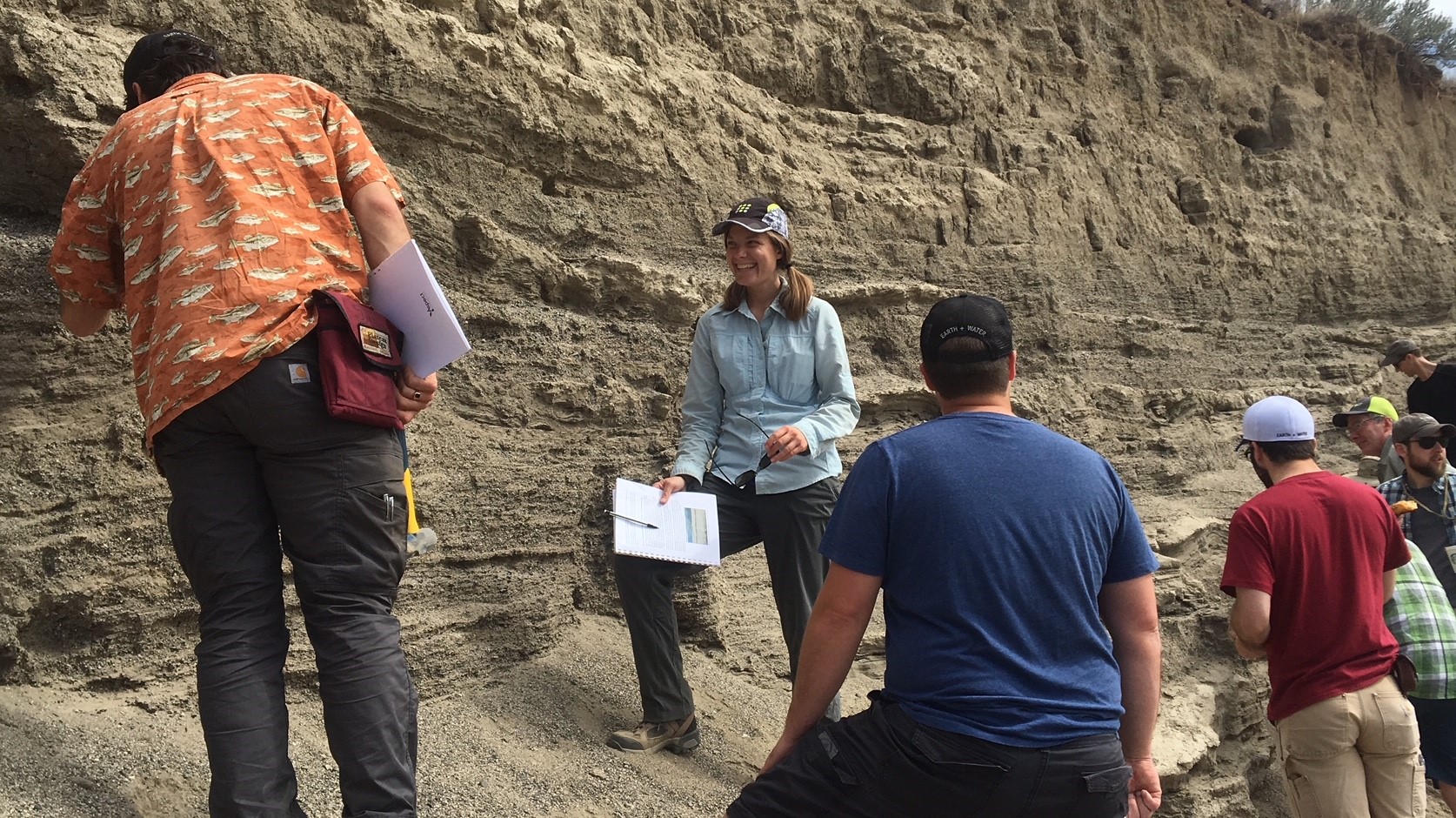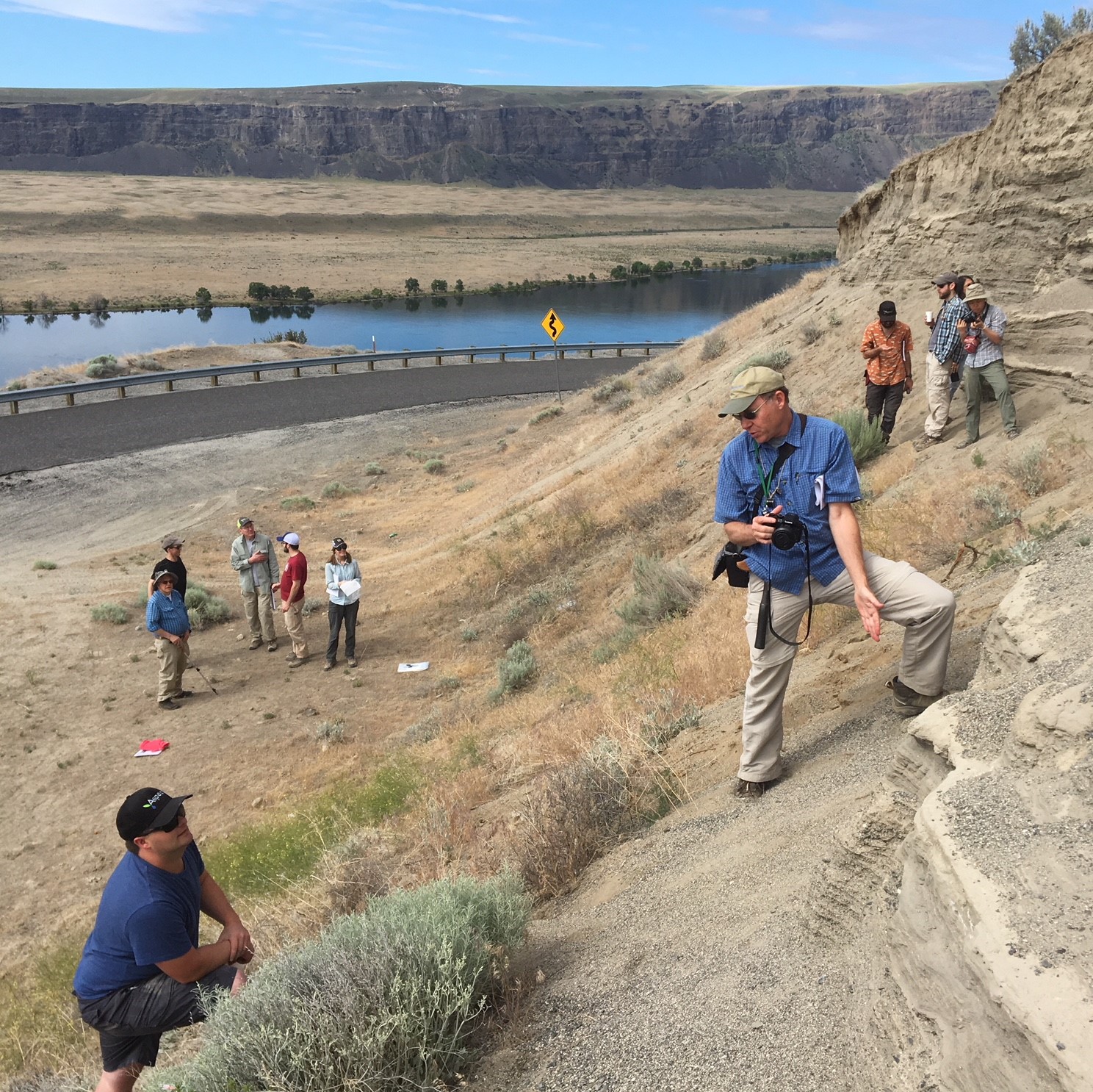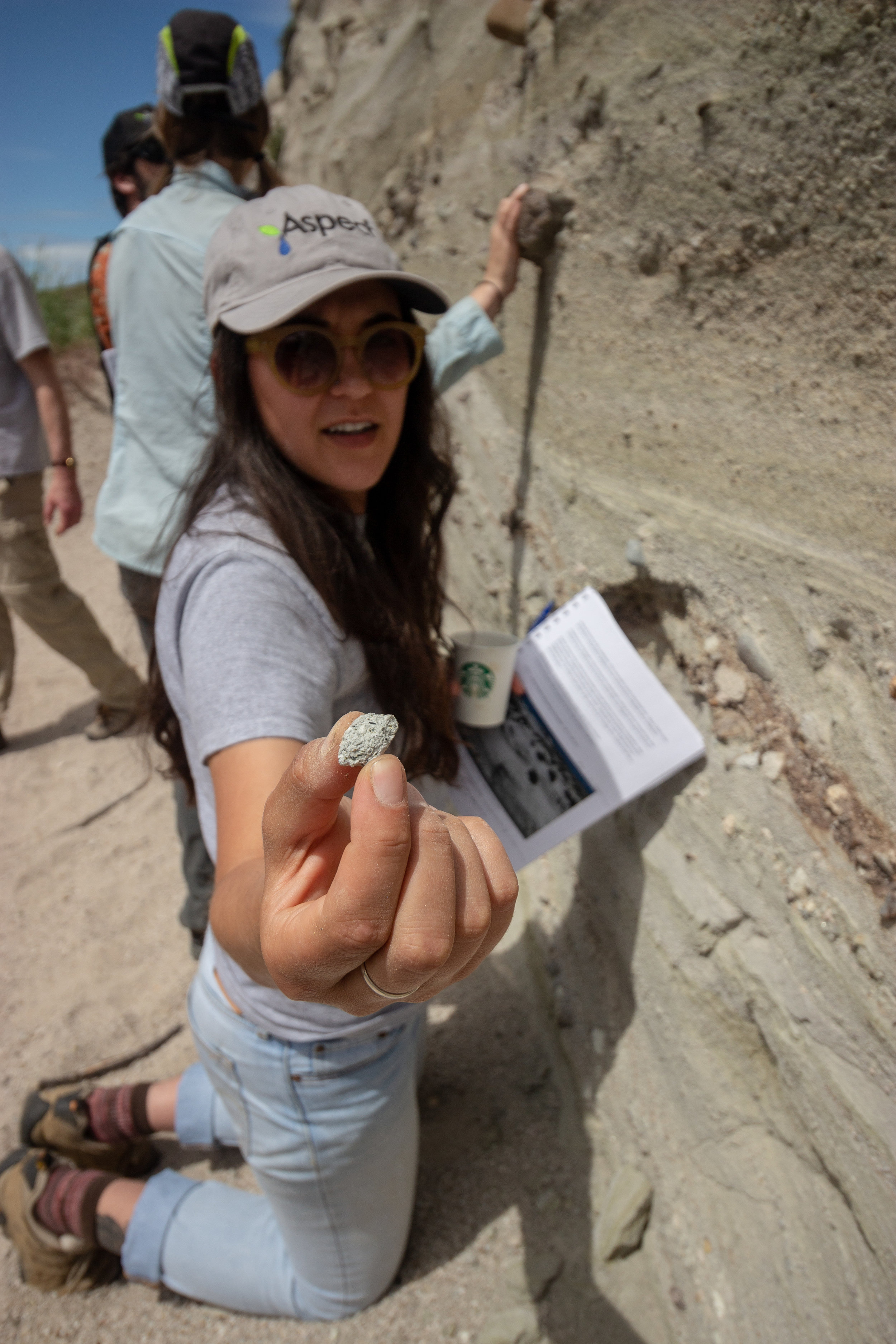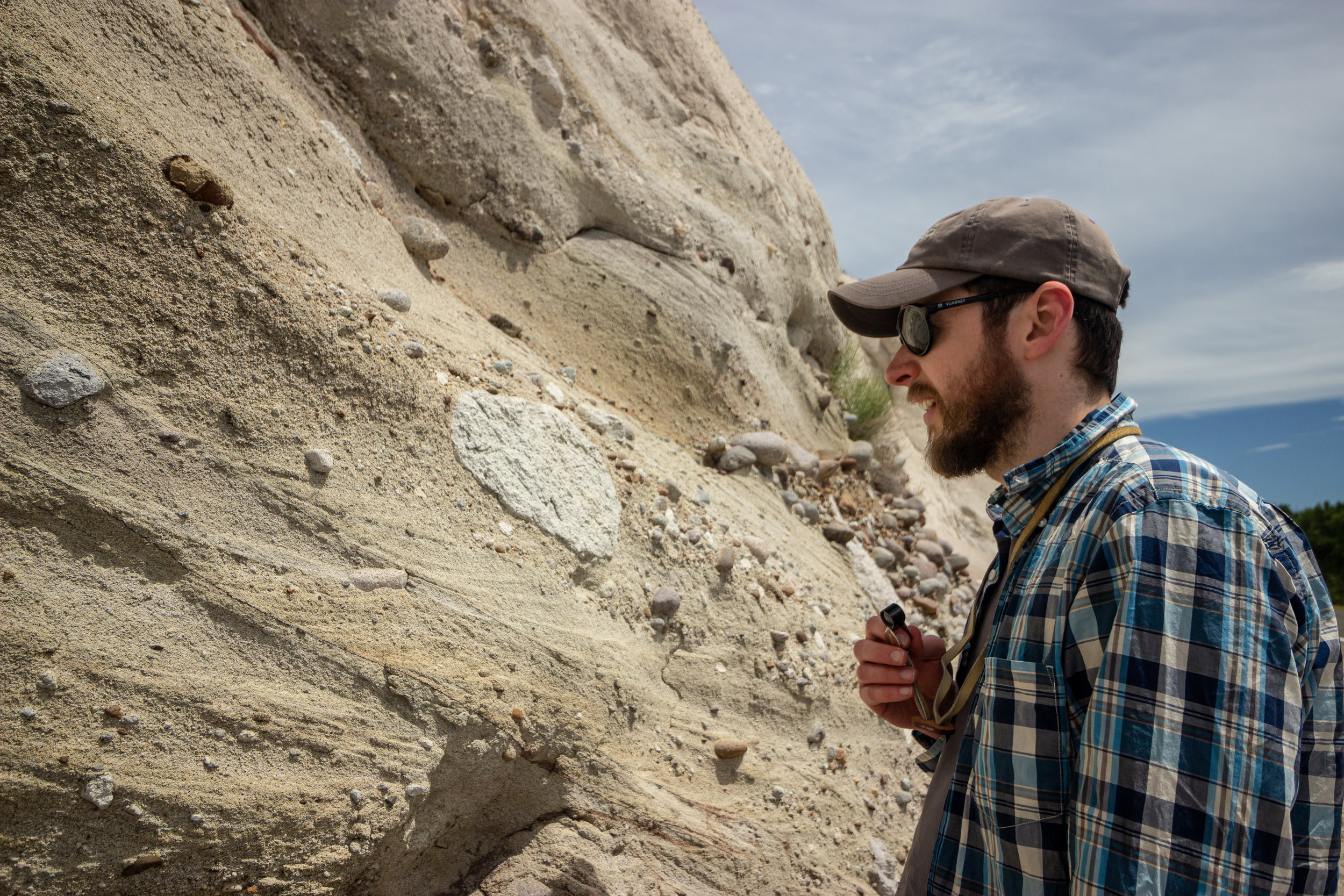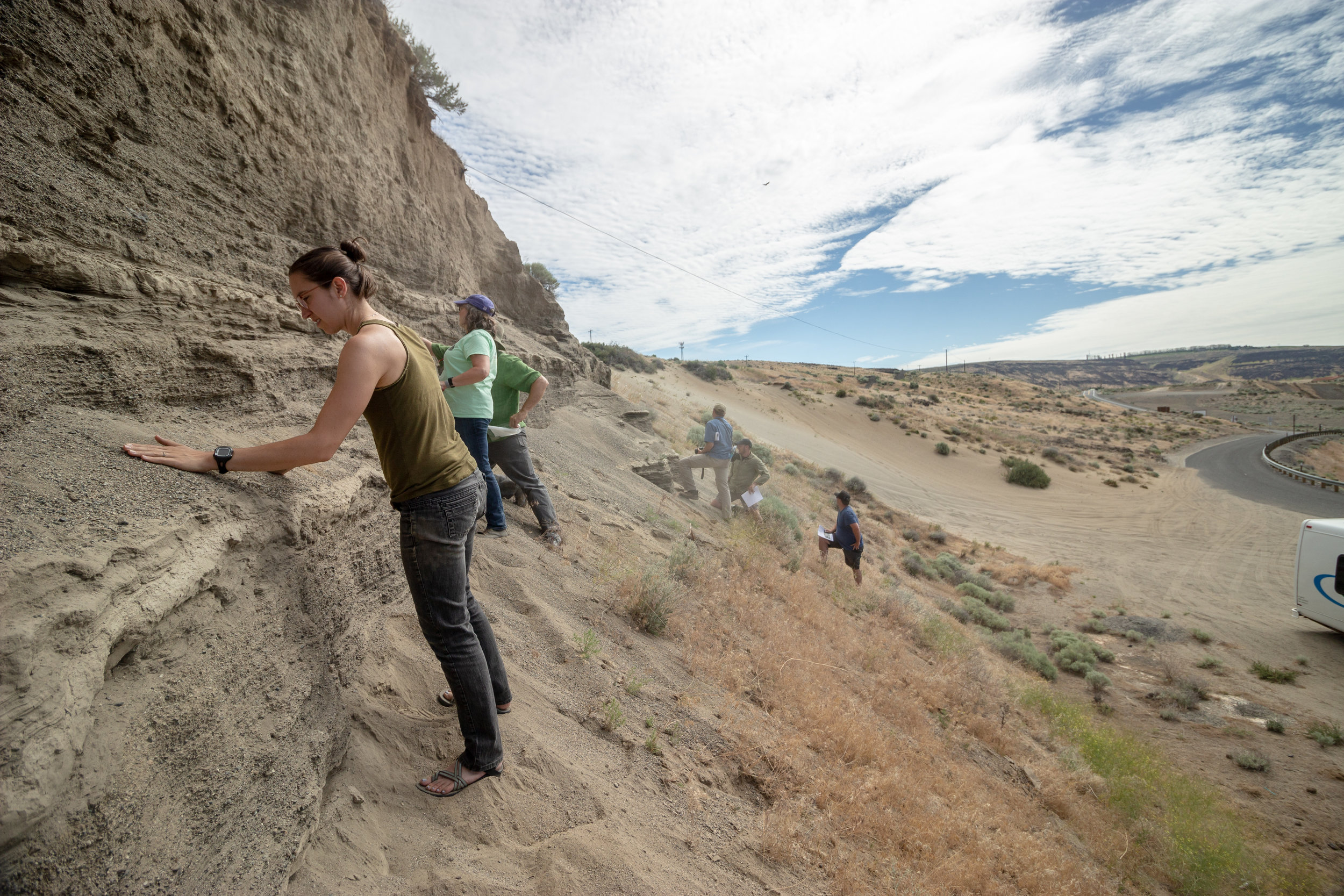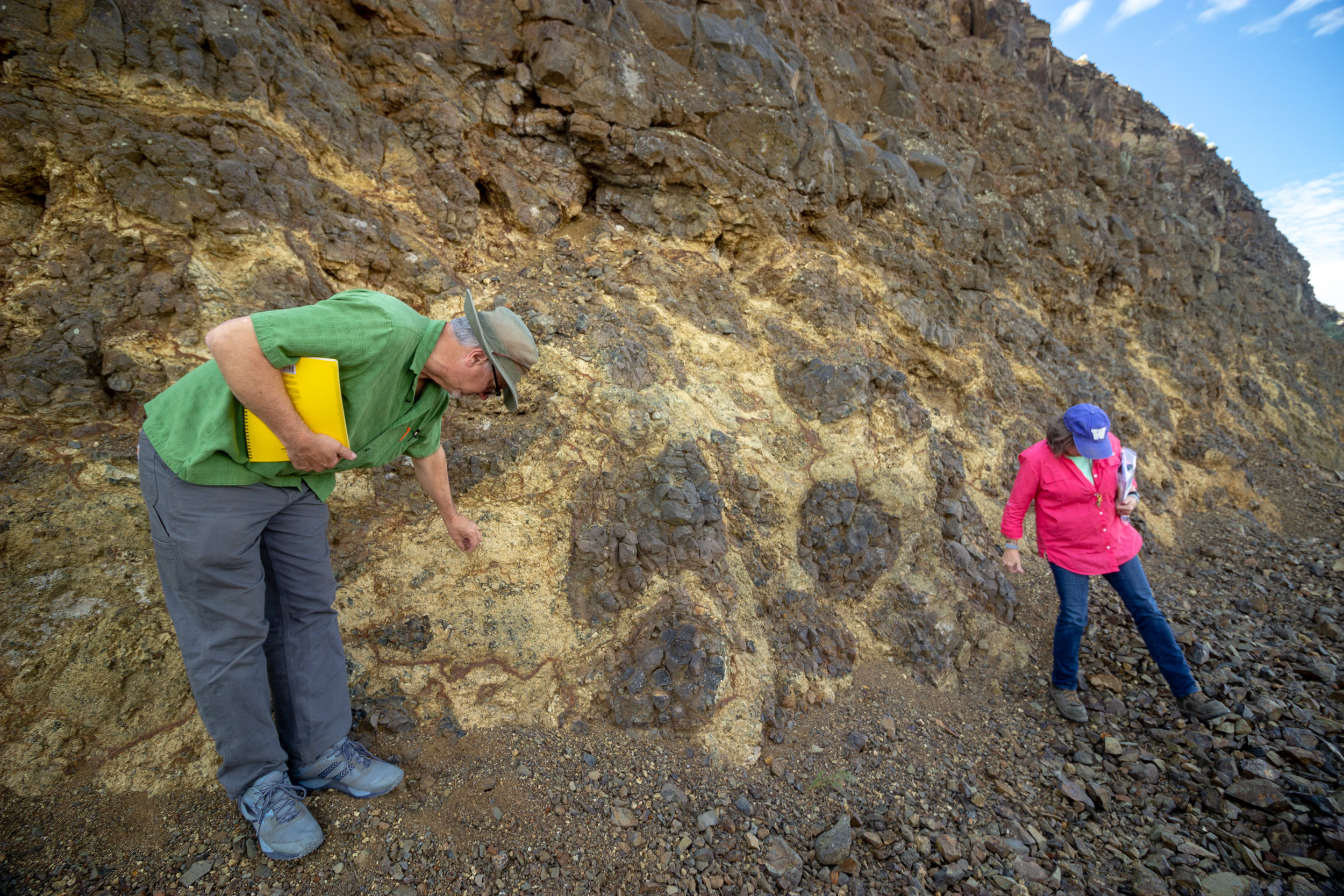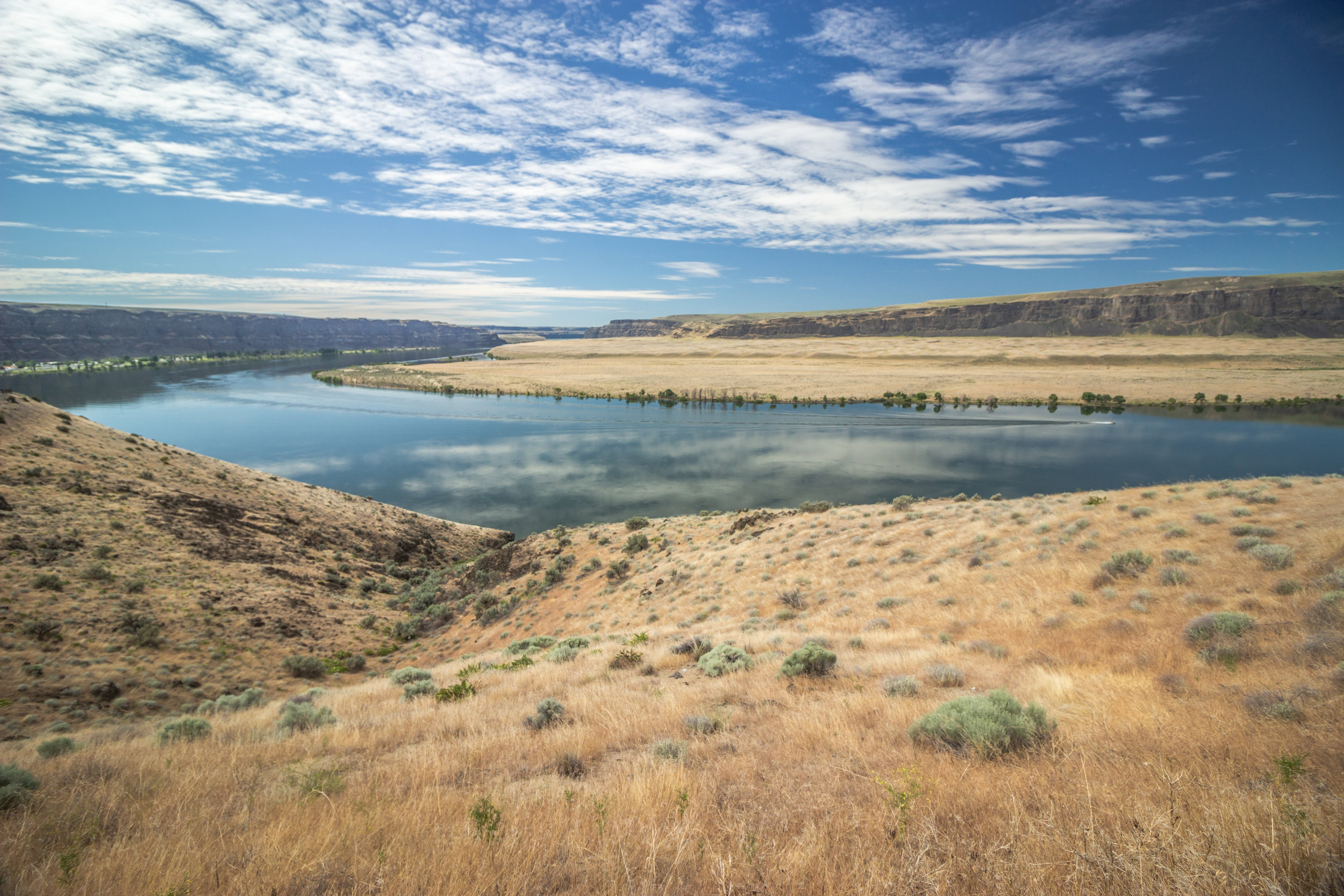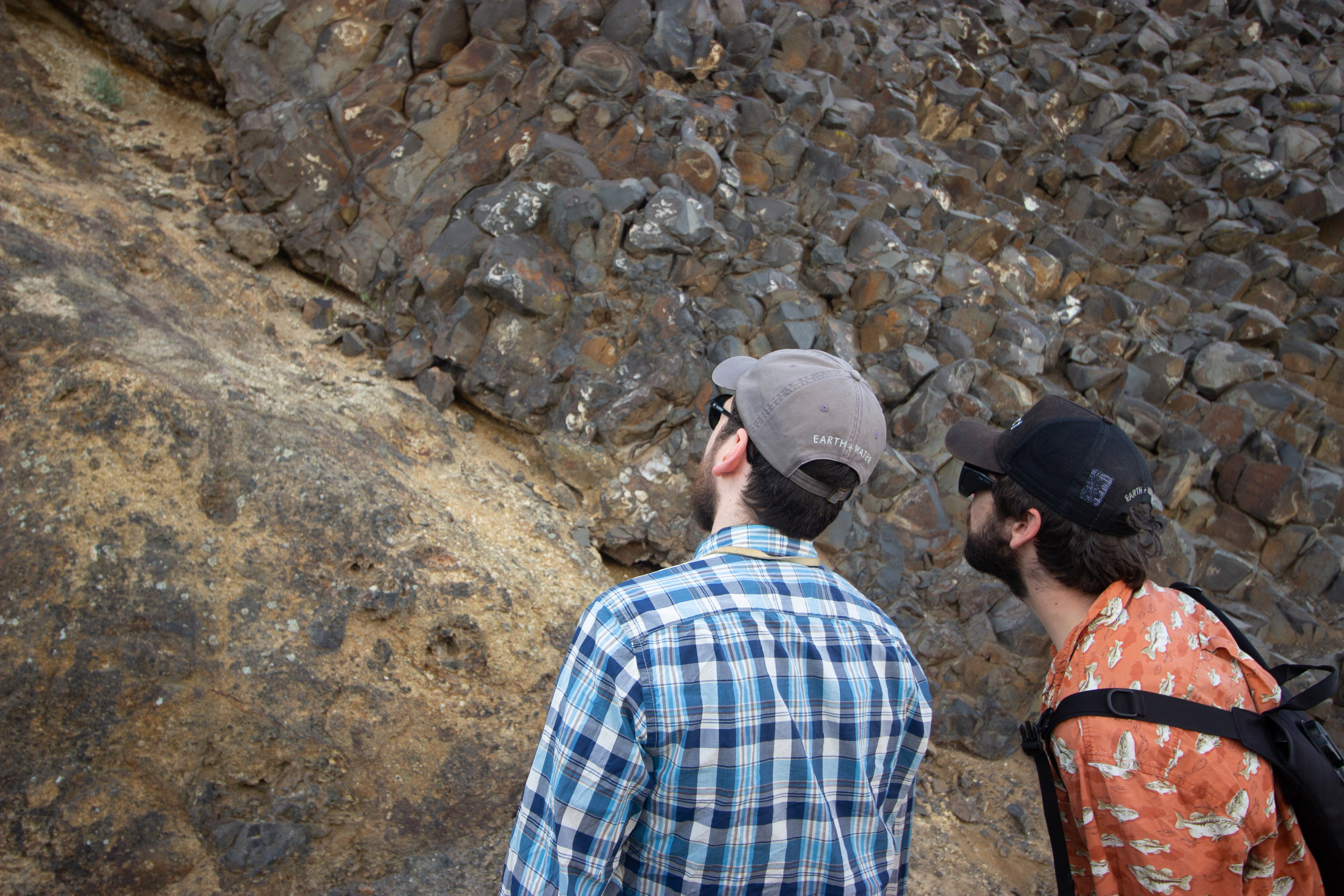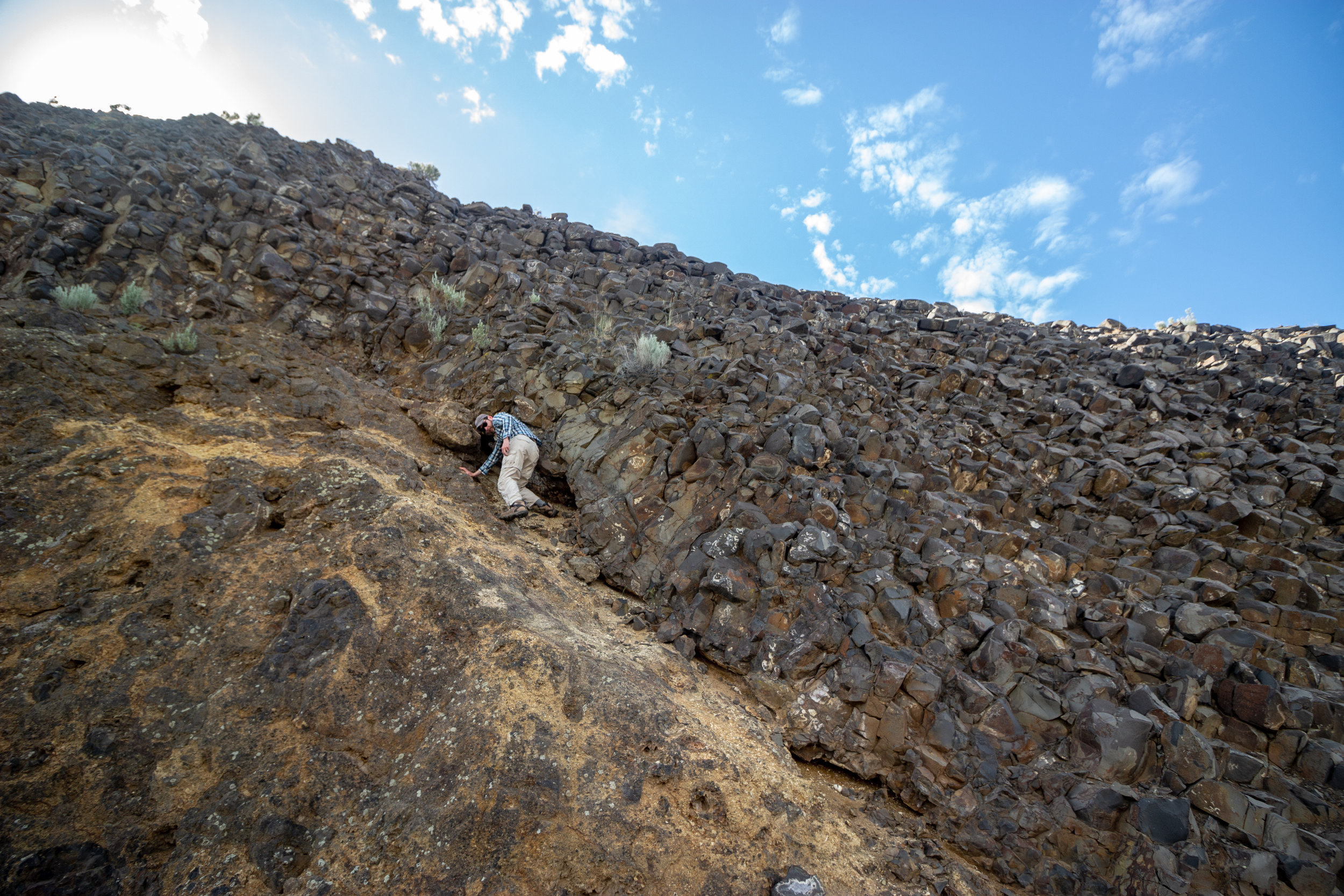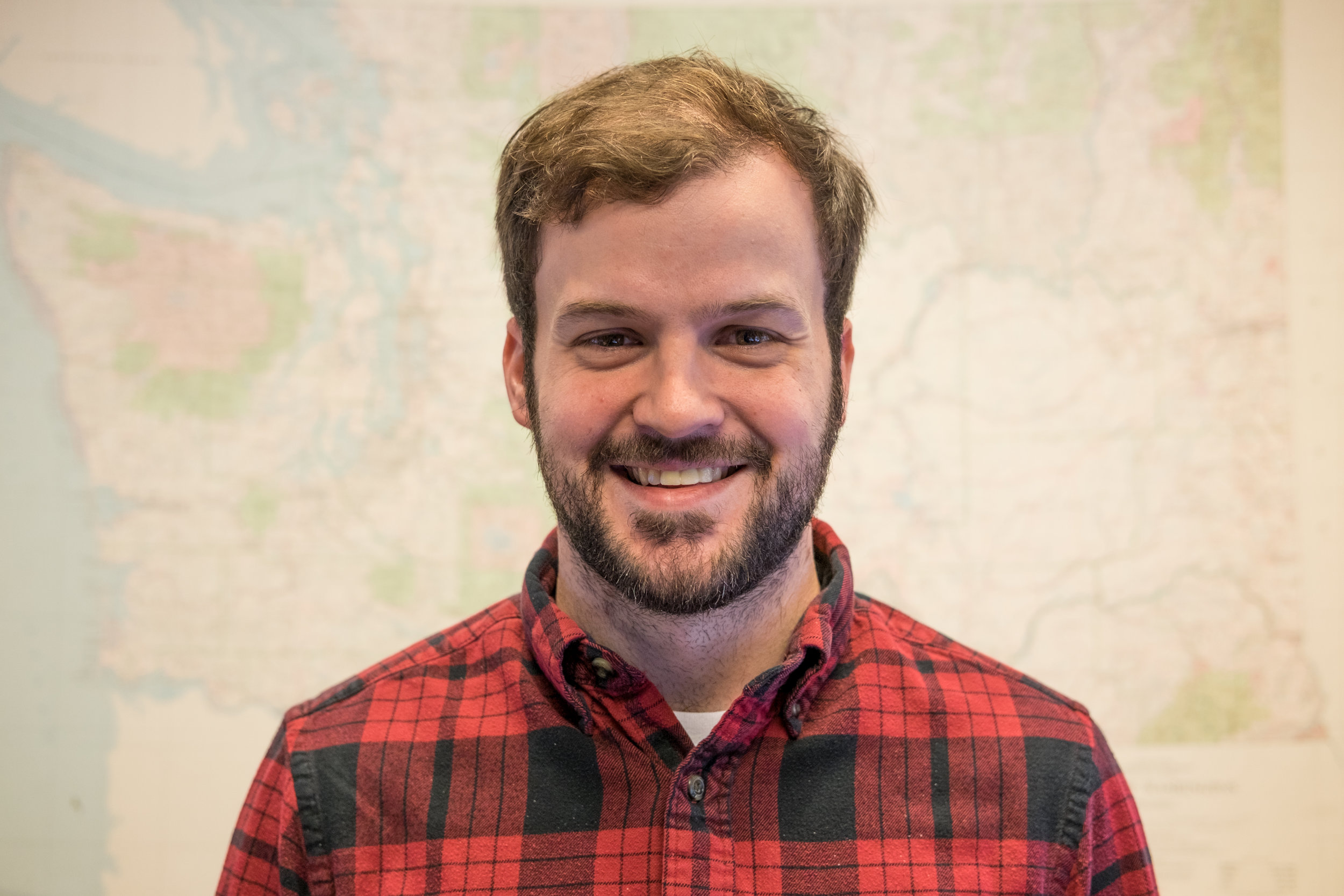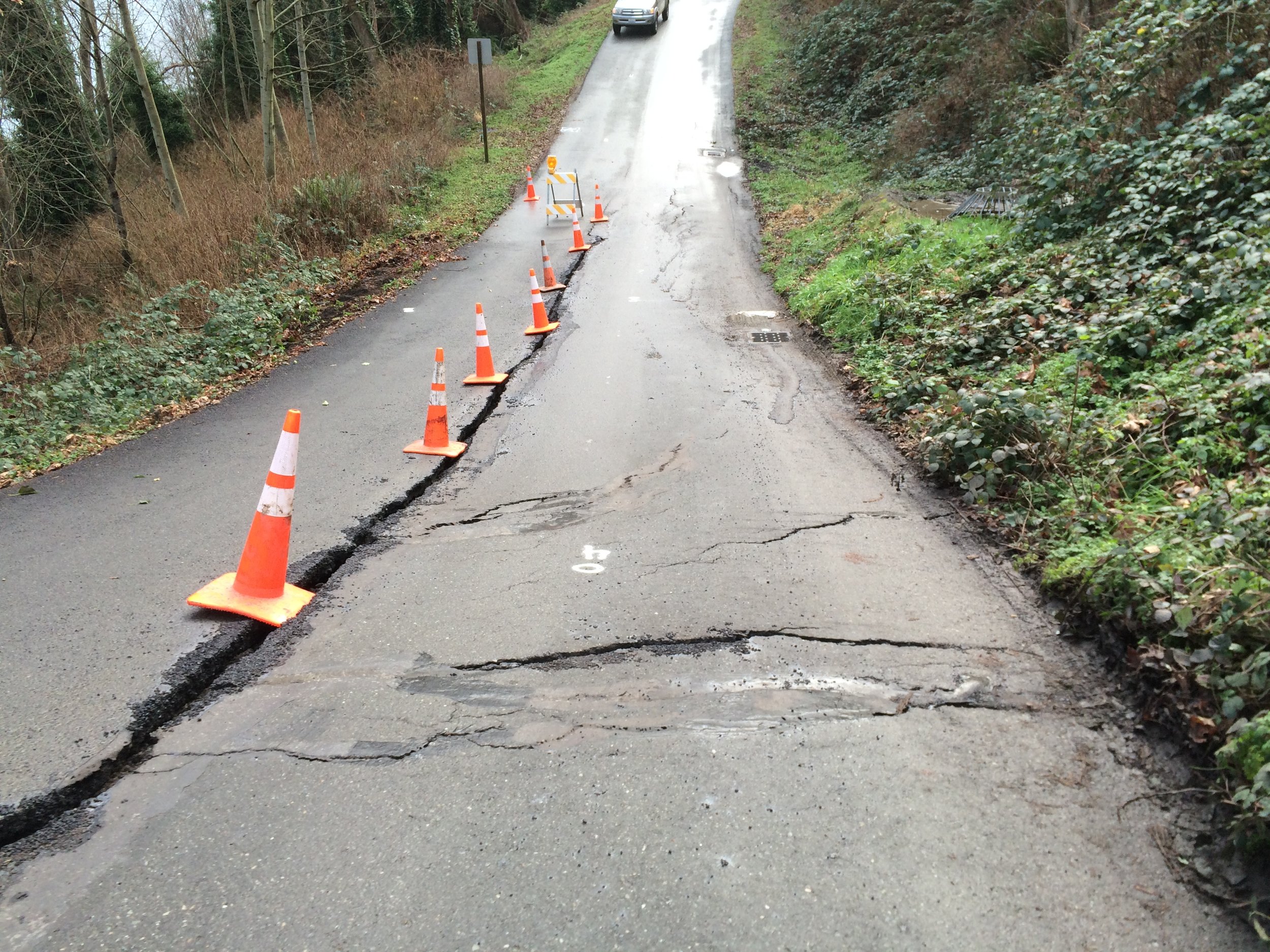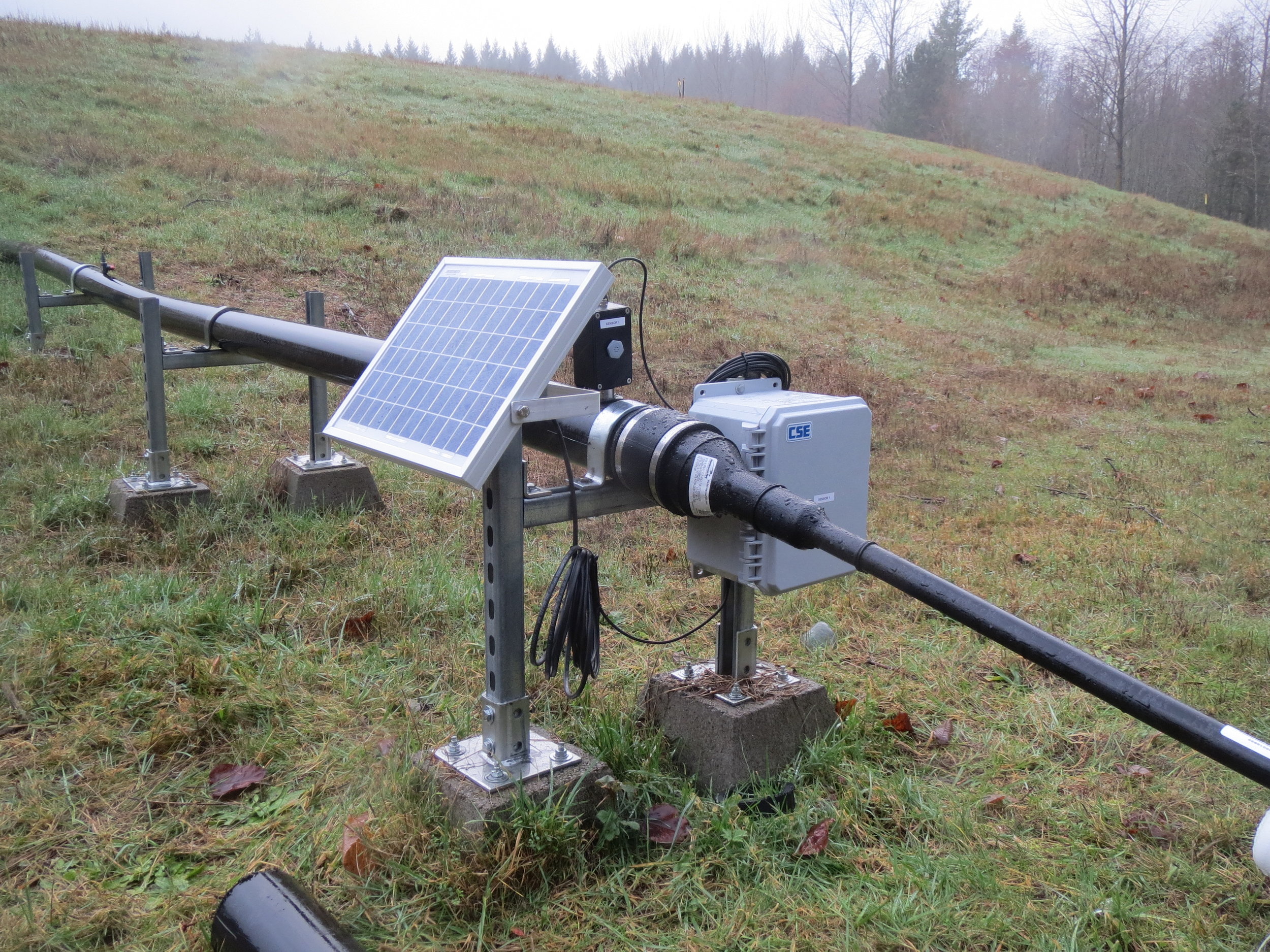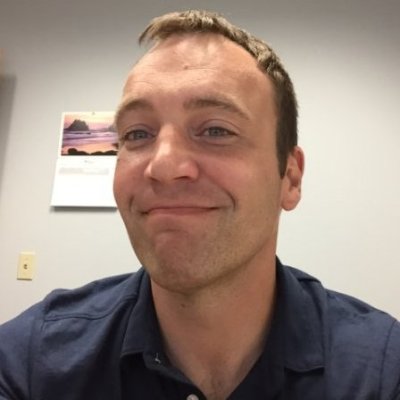Program Co-Chair Tyson Carlson will be leading the upcoming Water Law in Central Washington Seminar on August 16-17 in Ellensburg, WA. The conference includes a comprehensive introduction and update on water rights law, updates from regulators, and an inside look of some of the most recent trends and practices. Aspect’s Dan Haller will be joining the outstanding faculty and presenting on the Foster Pilot Project as a part of day two’s Senate Bill 6091 discussion. Learn more about the seminar here.
Meet Chad Hearn and Jason Yabandeh
Project Engineer Chad Hearn and Staff Data Scientist/Chemist Jason Yabandeh both recently joined Aspect's Seattle office. Here are five questions we asked to get to know them better.
Chad Hearn - Project Engineer
Chad and baby llama in Colca Canyon, Peru.
- Where are you from? If you’re not from the Pacific Northwest, what brought you here?
I grew up in Charleston, South Carolina. It was such a beautiful and fun place to grow up, and a great place to visit if you get a chance. After school, I lived in North Carolina before venturing this way. There’s so much that drew me here! If I had to pinpoint a few things it would be the climate, the Puget Sound, and the energy around outdoor activities like biking, skiing, and just getting out in the mountains. And I’m pretty sure we have the best summer weather in the country!
- What inspired you to pursue environmental consulting and remediation?
I think it was a pretty natural fit with my desire to have a hand in improving where we live and being motivated by helping others succeed. Remediation projects have tended to provide a lot of variety in the work side of the balance. Every site has its unique challenges and keeps you on your toes. There’s always a good learning experience to be had.
- What excites you and keeps you motivated?
It’s quite rewarding at the end of the day when you can say you’ve helped keep someone’s water supply clean, or maybe you just helped a client find a way to tackle a problem. I get really excited when I can help someone else look good. Environmental regulations, just like everything else around us, are constantly evolving. It’s exciting to have a hand in finding new ways to achieve outcomes that are better for everyone.
- What do you like to do when you aren’t working?
Shocker alert; when I’m not working I’m doing my best to explore the PNW and enjoy the outdoors. These days it’s mostly weekend camping trips with the pup, biking, skiing, reading, occasionally squeezing in a round of golf, and if I’m lucky catching a surf session along the frigid Pacific coast. And when I’m able to find some extended time off, travelling somewhere new is always a priority.
- Where in the world would you like to travel next? Where would your dream house be located?
Perhaps this is one of the reasons I like to travel to new places. How do you pick a place for a dream house when you’ve only caught a glimpse of the possibilities? Hopefully one day I find one. Until then…the criteria would have to be somewhere with a breeze, perhaps on a cliff overlooking an ocean (one that I can somewhat manageably get down to beach from), with mountains nearby, decent surf to keep me active and in the water, and maybe even have space for an organic farm and garden so I don’t have to sit in a car that will then be driving me to a grocery store on its own.
Jason Yabandeh - Staff Data Scientist/Chemist
At a Darrington, Washington farm with Bob (grey) and Howard (orange).
- Where are you from? If you’re not from the Pacific Northwest, what brought you here? I’ve lived in the Puget Sound area for my whole life, which is great because I love this little corner of the world.
- What inspired you to pursue data management? What made you curious about it?While my background is in chemistry, I was drawn to data management by an appreciation of its power. Everything we do in work and life involves data and having good control and understanding of that data is key in making accurate conclusions.
- What do you like best about your area of expertise? What excites you and keeps you motivated? Working in data allows me to get involved with many different interesting projects. It’s fun to learn about a site and then play with the data and see trends in contaminant concentrations -- which are hopefully on the decline! It’s also a great excuse to practice programming.
- What do you like to do when you aren’t working? I’ll take any chance I can get to go running, biking, hiking, or swimming with my two dogs. They are great training buddies for the Spartan races that I like to run every year. Besides the outdoorsy stuff, I really enjoy getting a few friends together for some games of the video or board variety. The current favourites are Mario Kart 8 Deluxe and Word Slam.
- If you could be with any musical artist living or dead, who would it be?
Definitely Queen. Not even necessarily to perform with them, as it would be an obvious understatement to say that my musical abilities pale in comparison, but just so I could bask in their glory.
Aspect’s Henry Haselton and Dave McCormack Join October Landslide Seminar
Aspect’s Principal Geotechnical Engineer Henry Haselton and Principal Engineering Geologist Dave McCormack will participate as faculty at The Seminar Group's Landslides program on October 25, 2018 at the Washington Athletic Club in Seattle. This seminar covers the science behind slope movement and landslides in Washington and discusses the liability concerns for a wide audience of attorneys, claims professionals, and real estate experts.
Aspect's Tom Atkins Presenting at ECOSS Stormwater Workshop
On October 18th and 19th in Renton, ECOSS will be hosting 201X: Advanced Stormwater Management. This two-day Industrial Stormwater Workshop, with an emphasis on case studies, provides ideas and solutions for stormwater treatment BMPs and sampling techniques to help those struggling to meet their benchmarks. The workshop includes visits to industrial sites with installed treatment technology. Participants can ask tough questions in a confidential setting.
Aspect is proud to sponsor this workshop, and Aspect’s Senior Associate Water Resources Engineer Tom Atkins will also be presenting a case study that highlights successful alternative pathways for industrial facilities to achieve ISGP compliance after trigging a Level 3 Corrective Action.
Learn more about the workshop HERE.
Designing Stormwater Runoff Solutions for Puget Sound Industry
In July's Storm Water Solutions magazine, Aspect's Tom Atkins writes about the challenge and successful problem-solving approach taken to help a Puget Sound industrial client meet stormwater runoff benchmarks to protect water quality in Seattle's Elliott Bay.
Read the story here: https://www.estormwater.com/meeting-benchmarks
Waypoint Park Opens Just In Time For Summer
Over the past five years, we’ve seen the Bellingham Waterfront District transform from a contaminated industrial site to a striking new waterfront park. We’re proud to have had a hand in cleaning up the site and providing geotechnical and environmental consultation throughout the design, permitting, and construction of the project. This included providing geotechnical design recommendations for siting of the 400,000-pound industrial acid ball tank turned public art piece titled “Waypoint”.
Congratulations to the City of Bellingham on your beautiful park!
Read more about the history of the park, the status of the waterway, and what’s next for the adjacent properties in this great Bellingham Herald article.
Meet Hannah McDonough and Taylor Rulien
Staff Geologist Hannah McDonough and GIS Analyst Taylor Rulien recently joined our Seattle office. Here are five questions we asked to get to know them better.
Hannah McDonough - Staff Geologist
Hannah sailing in the Puget Sound
- Where are you from? If you’re not from the Pacific Northwest, what brought you here?
I grew up in a log cabin on a dirt road in Vermont. As a kid, I cross-country skied, hiked, and tapped maple trees right outside my front door. I gained an appreciation for the natural world, which led me to study geology at the University of Rochester in New York. During field camp in Wyoming, I realized that I needed to be in the west to get a better sense of active geology. I went on to study at Utah State University and eventually found work in environmental consulting. I’ve stayed for the sushi, mountains, and water.
- What inspired you to pursue geology?
On a field trip in high school, we visited a local mountain and observed glacial striations in the large granitic bedrock. I was so taken by the power of earth’s movements around me, that I had to figure out how this happened and what other wonders are out there to explore. I felt right at home in the geology department since we got to dig up fossils and hike out to coal mines in Pennsylvania.
- What do you like best about your area of expertise?
I am drawn to the results of environmental consulting. It is very rewarding to work on projects across the state and a few years later point out, “that’s a place where I made a small improvement in this corner of the world.” I also enjoy the travel. I’ve seen more of Washington State during site visits than some locals see in a lifetime. It’s a great way to learn more about this dynamic state.
- What do you like to do when you aren’t working?
I took a year off from consulting and delved into the sailing world. I enjoy harnessing the power of the wind to explore new places and familiar places from a new perspective. I am also an amateur violinist, and love to jam with friends and family.
- If you could be onstage with any musical artist living or dead, who would it be?
Andrew Bird is my musical hero. It’d be a dream to be on stage fiddling and whistling with him.
Taylor Rulien - GIS Analyst
Taylor lounging on the north ridge of Mt. Stuart in Washington's central Cascades
- Where are you from? If you’re not from the Pacific Northwest, what brought you here?
I was born and raised in Alaska, this gave me a love for the outdoors but also a need to explore different states due to the isolation. I’ve since lived across the West from Oregon, California, Colorado, and now Washington. Washington has hit a good balance for me between the excitement of having a large city to the vast mountainous wilderness – I plan on calling this place home for a long time.
- What inspired you to pursue GIS?
I’ve always been fascinated by maps and GIS is a great way to keep that alive. With the large amount of spatial data available through our smartphones and other devices, there is a growing need and ability for exciting spatial analysis.
- What do you like best about your area of expertise? What excites you and keeps you motivated?
GIS is such a broad discipline, this allows me to continue to learn different skillsets from automation through programming, cartography, application development, and more complicated analysis.
- What do you like to do when you aren’t working?
I like doing anything in the outdoors. You’ll find me either climbing rocks, ice, or trail running in the mountains and enjoying a post IPA and burger at the closest brewery. Let me know if you are ever interested in an outdoor activity!
- Where in the world would you like to travel next?
There are dozens of places that I would love to travel to in the world but going back to Spain might be the most realistic and exciting for me. There are numerous world class climbing destinations!
Washington's Healthy Housing Program Helps Fund Cleanup for Affordable Housing
Today, the Seattle Daily Journal of Commerce (DJC) published a great overview of the new Washington State Healthy Housing Program and the inspiration for the program - Mt. Baker Housing's $55 million Maddux project. Check it out.
Does your firm want help turning brownfields into affordable units?
Ecology wants to offer grants to get brownfields cleaned up and reused, and is seeking applications from developers until Saturday.
By BENJAMIN MINNICK
Journal Construction Editor
There are thousands of blighted properties across the state that could be redeveloped to create more affordable housing, but contamination on these sites has mostly kept developers at bay.
Now the state and its consultants are testing a way to get more of these sites developed. The Healthy Housing Remediation Program provides grants to help affordable housing developers build on brownfields.
The departments of Ecology and Commerce created the program. To gauge interest, they are seeking applications from developers until Saturday. The list of firms that respond will be used to develop Ecology's 2019–21 cleanup budget plan and to demonstrate funding needs for the Legislature to consider during the 2019 session.
Dave Cook of Aspect Consulting, one of the consulting firms, said affordable housing developers face high property costs, water rights issues and Growth Management Act restraints. He said this program will help fund remedial investigation studies and site cleanup to make blighted properties more attractive to developers.
The program was inspired by Mt. Baker Housing's $55 million Maddux project, which is slated for a site on South McClellan Street, east of Martin Luther King Jr. Way South and near the Mount Baker light rail station.
Maddux will have two buildings with 144 apartments that are affordable to people earning up to 60 percent of the area median income. Nearly half of the units will be “family-size,” with two- and three-bedroom layouts.
Mt. Baker Housing will use $6.2 million in state funds to clean up contamination from a gas station and dry cleaner. The nonprofit signed an agreement last year with Ecology that lays out the cleanup plan, and Ecology provided $400,000 for initial studies.
“We've been in the Mount Baker neighborhood a long time and these five properties always intrigued us — but we knew conventional options to develop the site were limited,” said Conor Hansen, director of real estate at Mt. Baker Housing, in a news release. “Once we learned about the opportunity to work with the Department of Ecology and play a part in creating a new innovative model, we believed this site would be the perfect candidate to clean up, develop and activate a prominent intersection that will serve as a catalyst for the neighborhood and provide much-needed affordable housing near light rail.”
In early 2017, the city designated the five properties as a Redevelopment Opportunity Zone, which allows state funds to flow directly to Mt. Baker Housing for remediation.
The parcels total about a half-acre.
Mt. Baker Housing aims to select a general contractor shortly, and break ground in late 2019 and open in early 2021. Other team members are architect Mithun, development consultant Beacon Development Group and acquisition lender Impact Capital.
Cook said it will be two months before all the data is available about the site contamination, but it's “very contaminated.”
Aspect and law firm Perkins Coie led the environmental team for Mt. Baker Housing, and worked with Ecology on the pilot program.
Cook said Aspect and Perkins Coie can help interested developers with the pilot program's application process.
Central-Washington Geology: Field Trip!
Rocks have histories and their histories tell us stories.
This was the underlying theme of Aspect’s recent seminar on central Washington geology, led by esteemed experts Dr. Kathy Troost, LG, of Troost Geosciences and the University of Washington and Dr. Eric Cheney, Geology Professor Emeritus at UW. While topography alone makes clear the relevance of geology to the eastern Washington landscape, less sure is how the regional setting impacts the realm of projects—those distinct points on and below the ground where Aspect’s earth science and engineering work enters in.
Over two days in June, staff from across Aspect’s offices came together to learn about big-picture geology and earth processes related to 66 million years of local history, and then travel to the outcrops to see the deposits firsthand. Woven throughout were the contributions of each person’s unique experiences with geology and relevant insights from nearby project sites. Together, the balance provided each of us the tools to make sense of an otherwise complex landscape; a way to break it down into manageable pieces, put it back together, and learn what it has to tell.
Water Quality Sampling in the Wenatchee River
Learn about Washington Water Law
Aspect’s water law expert, Dan Haller, will be presenting on Water Banking for Agricultural Water Supplies at the 27th Annual Water Law in Washington conference (June 14-15). This year’s conference focuses on major legislative changes, new case law, and important practical information for water rights and resource management in the State of Washington.
Washington State’s First Affordable Housing Fund for Contaminated Sites: Applications Due June 30th
The Washington State Departments of Ecology and Commerce have created an innovative new program that will provide grants to affordable housing developers seeking to redevelop contaminated properties and increase the state’s housing stock.
The Healthy Housing Remediation Program will provide grant funds to nonprofit and private housing organizations to evaluate, investigate, and clean up contaminated properties to support the development of affordable housing. It was created by the Washington State Legislature during the 2018 session and will be funded in the 2019 session.
The program builds upon the successful partnership between Ecology and the Mt. Baker Housing Association on the Gateway Project in Seattle. Mt. Baker Housing’s Gateway Project will redevelop several contaminated properties for affordable housing near transit hubs in Seattle’s Rainier Valley. Aspect and law firm Perkins Coie — with lead counsel Mike Dunning — serve as Mt. Baker Housing’s environmental team on the Gateway Project. Perkins Coie and Aspect have worked directly with Ecology and Mt. Baker Housing to build this unique concept.
Ecology and Commerce started soliciting applications for the program on June 1 and the application period closes June 30. Perkins Coie and Aspect can help interested organizations complete and send in their applications. This needs to happen as soon as possible to meet the June 30 deadline.
If you have any questions about the Healthy Housing Remediation Program or about redeveloping contaminated properties for housing, please contact Dave Cook at 206.838.5837 and at dcook@aspectconsulting.com or Mike Dunning at 206.359.3464 and at mdunning@perkinscoie.com.
Before and after conceptual image of Mt. Baker Gateway Project in South Seattle – one of the affordable housing cleanup sites that the Healthy Housing program is inspired from.
Meet Jon Turk and James Bush!
Associate Hydrogeologist Jon Turk, LHG and Project Hydrogeologist James Bush, LHG recently joined Aspect's Water Resources practice supporting our Seattle office. Here are five questions we asked to get to know them better.
Jon Turk - Associate Hydrogeologist
Jon and family kayaking near Elephant Island at the Bai Tu Long Bay World Heritage Site in Vietnam.
- Where are you from? If you’re not from the Pacific Northwest, what brought you here?
I was born, raised, and educated in Ohio. I worked in Ohio for a few years, then transferred down to Florida for a previous firm. A few years in Florida was enough for the cravings of mountains and snow to take over. I’ve been in Olympia for about 9 years and consider it home.
- What inspired you to pursue hydrogeology? What made you curious about it?
My early childhood was spent on the Chagrin River, near Cleveland, with a short walk to shale and cliffs and fossils to collect. It was in the same valley that my grandparents homesteaded, and where my mother grew up…so maybe you could say I was born into it. Some of my earliest childhood memories are rock collecting along the river and sliding down the waterfalls. I started rock climbing as a teenager, and yet somehow started college as a pre-law student. After my first year, I switched majors and haven’t given anything else a second thought.
- What do you like best about your area of expertise? What excites you and keeps you motivated?
It is not so much my area of expertise (quantitative hydrogeology), but consulting in general, that gets me excited. The creative and technical problem solving, rewards of a successful project and happy client, providing value to the communities I work in, are really the most rewarding parts of it for me.
- What do you like to do when you aren’t working?
Any sort of family adventure is at the top of the list. We try to raise our kids in a way that keeps them engaged with us, and consequently have dragged them through some incredible places way off the beaten path. We enjoy the outdoors as much as possible, climbing, cycling, kayaking, fishing, and traveling the world experiencing new cultures. I do some volunteer work with the WaYa Outdoor Institute, a non-profit summer day camp founded by my wife and friends, that combines STEM curriculum with outdoor adventure. I’m also an avid DIYer and roughly half way through a 5-year plan of complete home renovations.
- Where in the world would you like to travel next?
The next “big” trip we are planning will be in summer of 2019 to Nepal, Tibet, and Sri Lanka. However, my dream trip would be to spend some time down in Patagonia, then hop on a cruise to Antarctica. I hope to see a narwhal at some point in my life—they really are the closest living thing to a unicorn you know.
James Bush - Project Hydrogeologist
- Where are you from? If you’re not from the Pacific Northwest, what brought you here?
I grew up in the Boise, Idaho area. It’s a place I really love, and one where I felt like I had a lot of opportunities. I moved to Washington seven years ago for the opportunity to practice hydrogeology with some talented folks, and it’s worked out really well.
- What inspired you to pursue hydrogeology? What made you curious about it?
My hometown (Eagle, Idaho) is fairly arid and very dependent on groundwater, so folks started to worry about water when the area began to undergo a population boom. I knew that I wanted to be a scientist who did work that had a direct impact on the community around me. Water is a resource for which there are no substitutes, so hydrogeology was a great fit for me.
- What do you like best about your area of expertise? What excites you and keeps you motivated?
The wide range in scale on which my work has an impact. Water is so connected across space and time, and it touches everyone’s lives in so many places. It’s invigorating and daunting when I think about how my work today will affect folks potentially many miles downstream and many years into the future.
Day-to-day, I love the investigative nature of hydrogeology. Working out how to evaluate a resource that is mostly hidden in an efficient manner makes me feel like Sherlock Holmes on a case. Bringing together sparse information to make deductions and piece together an accurate picture gets me out of bed in the morning.
- What do you like to do when you aren’t working?
My nights are usually taken up by rec league softball or volleyball. I’ve played baseball and softball since I was small, and being out on the diamond with friends on a summer night can’t be beat. I just got into volleyball last year, and learning an entirely new sport has been the best sort of challenge. I’ve also rediscovered my love of skiing the past few winters, and can’t wait until next season!
- Where in the world would you like to travel next?
In all seriousness I’m hoping that commercial spaceflight takes off in my lifetime. Seeing the Earth from space, experiencing microgravity, and seeing the stars without the atmosphere are things I couldn’t pass up if the opportunity every comes!
Next Step in Icicle Creek Basin Solution – June 27 Public Hearing in Leavenworth
Taking the next step in a process that began in 2012, Chelan County and the Washington State Department of Ecology (Ecology) have released the Draft Programmatic Environmental Impact Statement (PEIS) for the Icicle Creek Water Resource Management Strategy (Icicle Strategy). The Draft PEIS will be summarized and discussed at a public hearing on Wednesday, June 27 from 4pm to 8pm at Leavenworth Festhalle, 1001 Front Street, Leavenworth, WA. The PEIS evaluates five alternatives to help the Icicle Work Group (IWG) map out a solution for instream flow, tribal, agricultural, domestic, and recreational water needs for the Icicle Creek Subbasin in central Washington.
See Chelan County’s Icicle Strategy website for more information. Aspect has helped coordinate the development of the PEIS, along with multiple teaming partners and co-leads Chelan County and Ecology.
Water Banking in the West
Water banking is increasingly being looked at as an innovative approach to storing and releasing water in water-challenged areas of the West. In May’s issue of The Water Report, Aspect’s Dan Haller wrote an in-depth look at water banking in Washington state, how it compares to the rest of the West, and what recent legislative changes mean for the successful adoption of this water supply tool. Click below to read the article.
Strengthening our Water Resources Services with Jon Turk and James Bush
Aspect strengthens its water resources practice with the addition of Associate Hydrogeologist Jon Turk, LHG and Project Hydrogeologist James Bush, LHG. Jon is a hydrogeologist with over 16 years of experience focused on quantitative hydrogeology for water, wastewater, and industrial markets for public agencies and private industry. He will work out of Olympia, supporting Aspect’s Seattle office as well as expanding Aspect’s capabilities for clients in the south Puget Sound area. James brings over seven years of hydrogeologic and numerical modeling experience for groundwater projects.
Jon Turk
James Bush
“Jon’s background and expertise are a seamless match with Aspect’s water resources client base,” says Tim Flynn, Aspect’s President. “We’re also excited to continue to introduce Aspect to all the south Puget Sound and western Washington clients that Jon has built strong relationships with.”
While at his previous firm, Brown and Caldwell, Jon led an integrated water resources management team providing regional leadership and national consulting for complex and integrated surface water and groundwater systems. He brings recognized skill in groundwater recharge, water supply management, wastewater reuse, and numerical modeling for clean water projects as well as site remediation support for Brownfields and Superfund projects. James also comes from Brown and Caldwell, where he was a primary technical contributor to groundwater projects, environmental site characterization, and numerical modeling projects throughout Washington, Oregon, and the western United States.
“I’m excited to join the Aspect team and proud to join such a talented group of consultants,” says Jon. “I’ve always considered Aspect as one of the premier hydrogeologic consultancies in the region, with a strong brand that truly values both innovative and practical approaches to solving complex water resource challenges.”
Reigning in the Looming Landslide in Kitsap County
As the Washington Boulevard landslide continues to move, it threatens to cut numerous Kingston residents off from the town and emergency responders.
Since a significant slide in 2006, Aspect has provided geotechnical services at Washington Boulevard, including gathering data and monitoring and studying movement along the slope. Recently, Kitsap County Public Works decided to implement a slope dewatering system to remove groundwater from the landslide mass and increase the stability of the hillside and roadway.
Aspect’s Andy Holmson provides some insight to the solution in this Kitsap Daily News article.
Testing Innovative Methods for Landfill Gas Monitoring in King County
Scientists from the CSE Corporation (a company developing cutting-edge gas detection devices used in air-quality monitoring) and Aspect remediation engineers are working in partnership to develop new methods for continuous methane-gas monitoring at landfills. CSE’s methane-gas monitoring products use solar-powered instruments outfitted with telemetry. Solar power eliminates the need for frequent battery replacement while telemetry allows remote monitoring of the data. With cooperation from King County Solid Waste Division, CSE has provided Aspect with test units to install at several of the County’s closed landfills to gauge the effectiveness of this technology for the landfill industry.
CSE has roots in the mining industry and a history of innovations, including the first self-contained rescue-breathing apparatus for use by mine personnel. KCSWD, Aspect, and CSE are testing the devices ability to monitor methane, a primary source of greenhouse gas emissions from landfills.
Got methane? CSE remote methane monitoring setup with telemetry and solar panel on a passive landfill gas collection system in King County, Washington.
Setting the Stage for Alaska Airlines’ 128,000-Square-Foot Groundbreaking
Alaska Airlines recently deepened its local roots with a groundbreaking for a new 128,000-square-foot corporate facility in SeaTac.
Aspect is helping set the stage for this by providing environmental and geotechnical services to prep the property for development. Our team evaluated property-wide environmental conditions and is serving as the geotechnical engineer of record, which includes designing foundations and shoring walls. Aspect pilot tested and designed a deep stormwater infiltration system to sustainably manage stormwater and get it back into the ground in a more native/natural way. This helped achieve the sustainability goals of the project. We will be on hand to perform construction observation as that kicks off.
The “Hub” will be a 6-story office building scheduled for construction and then move-in for first quarter 2020.
The May 3rd groundbreaking ceremony was attended by various city, county and state dignitaries, including governor Jay Inslee, Congressman Adam Smith, King County Executive Dow Constantine and Alaska Airlines CEO Brad Tilden, as well as Alaska employees and members from the surrounding community.
Read the full story here: Alaska Airlines Celebrates Groundbreaking of 128,000 SQFT “Hub” Project, Expanding Presence in SeaTac
Meet Mike Mills
Mike Mills recently joined Aspect's Portland, Oregon office. Here are five questions we asked to get to know him better.
Mike Mills, Project Software Developer
1. Where are you from? If you’re not from the Pacific Northwest, what brought you here?
I was born in Portland Oregon, but grew up in Sisters, Oregon (just north of Bend).
2. What inspired you to pursue software development? What made you curious about it?
I learned how to code my freshman year of high school and from then on knew exactly what I wanted to do with my professional life.
3. What do you like best about your area of expertise? What excites you and keeps you motivated?
I really enjoy solving complex problems, which coding allows me to do with ease. The thing that excites me the most is to finish a project and have a client be completely satisfied with the work that’s been done.
4. What do you like to do when you aren’t working?
When I‘m not working, I enjoy running around the Portland waterfront and reading with my wife. I also enjoy salmon fishing every season with my Dad and Mom in Newport, Oregon.
5. Where in the world would you like to travel next?
After visiting Italy this last October, I would love to go back to Europe and visit either France or Spain. My wife speaks French, so that would be a bonus having a translator.



